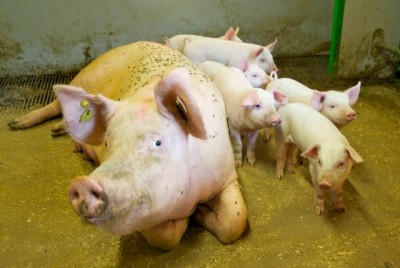Norway’s powerful farmers’ lobby often claims how farmers need their subsidies and protection from foreign competition, in order to ensure domestic food production. Now comes news they’re producing far more meat than the Norwegian market can absorb, without much if any price relief for consumers at the grocery store.

Last summer, even in the midst of the drought, a farmer in Vestfold willfully destroyed his fields of broccoli because he didn’t think prices were high enough. Earlier in the year came news that meat lockers at the farmers’ owned coops that are supposed to control production were full of excess lamb meat.
Now Norwegian Broadcasting (NRK) is reporting over-production of pork as well, at a time when Norwegian are eating less meat. The decline in consumption has been pegged to everything from health and price issues to climate concerns because of the emissions tied to meat production.
“Right now there’s a very bad mood among pork producers,” Arne Einar Reed told NRK. He’s raises pigs on his farm at Reed in Gloppen, in the mountainous and rural county of Sogn og Fjordane.
‘Much worse than usual’
“The prices of meat always go up and down, but right now they’re much worse than usual,” Reed said. The farmers are getting lower prices because of their over-production and then the meat is frozen and stored in meat lockers. In some cases it’s earlier been dumped abroad but rarely sold at lower prices at the grocery store, in an apparent effort to keep retail prices more stable and, arguably, artificially high.
“For us farmers it can amount to as much as a few kroner per kilo less, and that’s quite dramatic,” Reed told NRK. “For folks who have invested million in new barns and operations, it raises great concern.”
NRK noted that it’s not unusual that meat production in Norway is higher than what’s needed for domestic consumption, but it is unusual when there’s overproduction of both pork, lamb and beef at the same time. In the case of pork, the current overproduction is said to be a result of lower consumption of pork and higher production.
According to NRK, full 3,032 tons of lamb and sow meat, 2,219 tons of pork and 2,718 tons of beef are hung up in Norwegian meat lockers. There was even more lamb and sow stashed away in storage two years ago (3,208 tons) but just 824 tons of pork and 21 tons of beef.
Production goals backfire
Reed claimed he was frustrated that the over-production had built up so much before anything was done about it. He didn’t specify who should have “done something,” and did not seem to blame the farmers themselves. The stated goal of Norway’s largest farmers’ organization, Norges Bondelag, which has around 63,000 members, is to “increase sustainable food production and self-sufficiency based on Norwegian resources.”
The large farmers-owned coop Nortura, meanwhile, is widely viewed as the “market regulator” for beef, lamb and pork under the “Gilde” brand, and poultry under the “Prior” brand. Other competing meat processors have also emerged in Norway in recent years.
Agriculture Minister Bård Hoksrud of the Progress Party agrees that overproduction is” not good.” It’s particularly ironic given all the farmers’ complaints and fears last summer that they’d have to slaughter livestock earlier than usual because the drought dried up fields that were supposed to grow animal feed for the winter. Farmers received record-high compensation from the state to help cover their drough-induced losses.
‘Up to the players in the market’
“It’s not so easy to just ‘shut off the tap’ to cut food production, like you can with production of other things,” Hoksrud told NRK. “One of the reasons we have overproduction is that we have clever farmers who have done a very good job of breeding more productive animals.”
He acknowledged how that has happened at a time when Norwegians are buying and eating less meat, stressing, though, that “folks must be allowed to eat what they want. It’s up to the players in the market to see to it that there’s a better balance in the long term.”
In some cases, the state is paying pork producers to shut down their operations. Reed isn’t happy about that, since farming is an important livelihood in rural areas of Norway.
“I hope folks here don’t accept that, because we need the farmers that we have,” Reed told NRK. “We just have to hope that prices recover so that we’re paid more for our meat.”
newsinenglish.no/Nina Berglund

